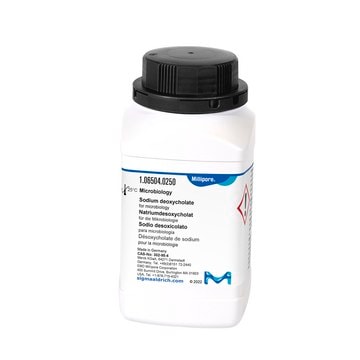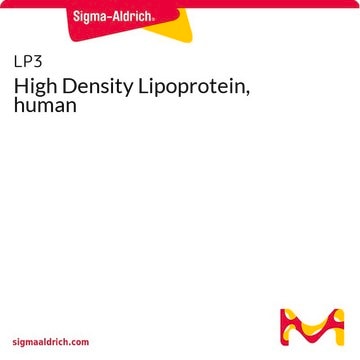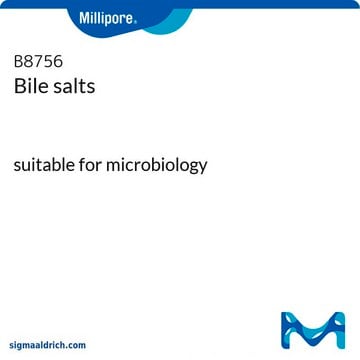S9875
Sodium choleate
Sinónimos:
Choleic Acid Sodium Salt, Desoxycholic acid sodium salt
Iniciar sesiónpara Ver la Fijación de precios por contrato y de la organización
About This Item
UNSPSC Code:
12161900
NACRES:
NA.25
Productos recomendados
description
anionic
technique(s)
electrophoresis: suitable
Categorías relacionadas
Application
Sodium choleate has been used in a study to assess the resistance of esophageal adenocarcinoma to bile salt. It has also been used in a study to investigate the role of a putative tyrosine-O-sulfate receptor in the targeting and/or intracellular transport of tyrosine-sulfated proteins.
Other Notes
This is a loosely used term applied to a crude ox bile extract which contains the sodium salts of taurocholic, glycocholic, deoxycholic, and cholic acids.
Storage Class
11 - Combustible Solids
wgk_germany
WGK 3
flash_point_f
Not applicable
flash_point_c
Not applicable
ppe
Eyeshields, Gloves, type N95 (US)
Certificados de análisis (COA)
Busque Certificados de análisis (COA) introduciendo el número de lote del producto. Los números de lote se encuentran en la etiqueta del producto después de las palabras «Lot» o «Batch»
¿Ya tiene este producto?
Encuentre la documentación para los productos que ha comprado recientemente en la Biblioteca de documentos.
Los clientes también vieron
The Resistance of Esophageal Adenocarcinoma to Bile Salt Insult is Associated with Manganese Superoxide Dismutase Expression
Schiffman, S., et al.
The Journal of Surgical Research, 171, 8-8 (2011)
M C Liu et al.
Cytotechnology, 23(1-3), 143-149 (1997-01-01)
By employing the affinity gel fraction technique, we have detected a 175 kDa tyrosine-O-sulfate (TyrS)-binding protein in sodium choleate extracts of the microsomal membrane fractions of bovine liver and pancreas, as well as canine liver and pancreas. Western blot analysis
Suguru Yamasaki et al.
Scientific reports, 9(1), 177-177 (2019-01-19)
During infection, Salmonella senses and responds to harsh environments within the host. Persistence in a bile-rich environment is important for Salmonella to infect the small intestine or gallbladder and the multidrug efflux system AcrAB-TolC is required for bile resistance. The
Giovanni Sorrentino et al.
Gastroenterology, 159(3), 956-968 (2020-06-03)
Renewal and patterning of the intestinal epithelium is coordinated by intestinal stem cells (ISCs); dietary and metabolic factors provide signals to the niche that control ISC activity. Bile acids (BAs), metabolites in the gut, signal nutrient availability by activating the
Nuestro equipo de científicos tiene experiencia en todas las áreas de investigación: Ciencias de la vida, Ciencia de los materiales, Síntesis química, Cromatografía, Analítica y muchas otras.
Póngase en contacto con el Servicio técnico











